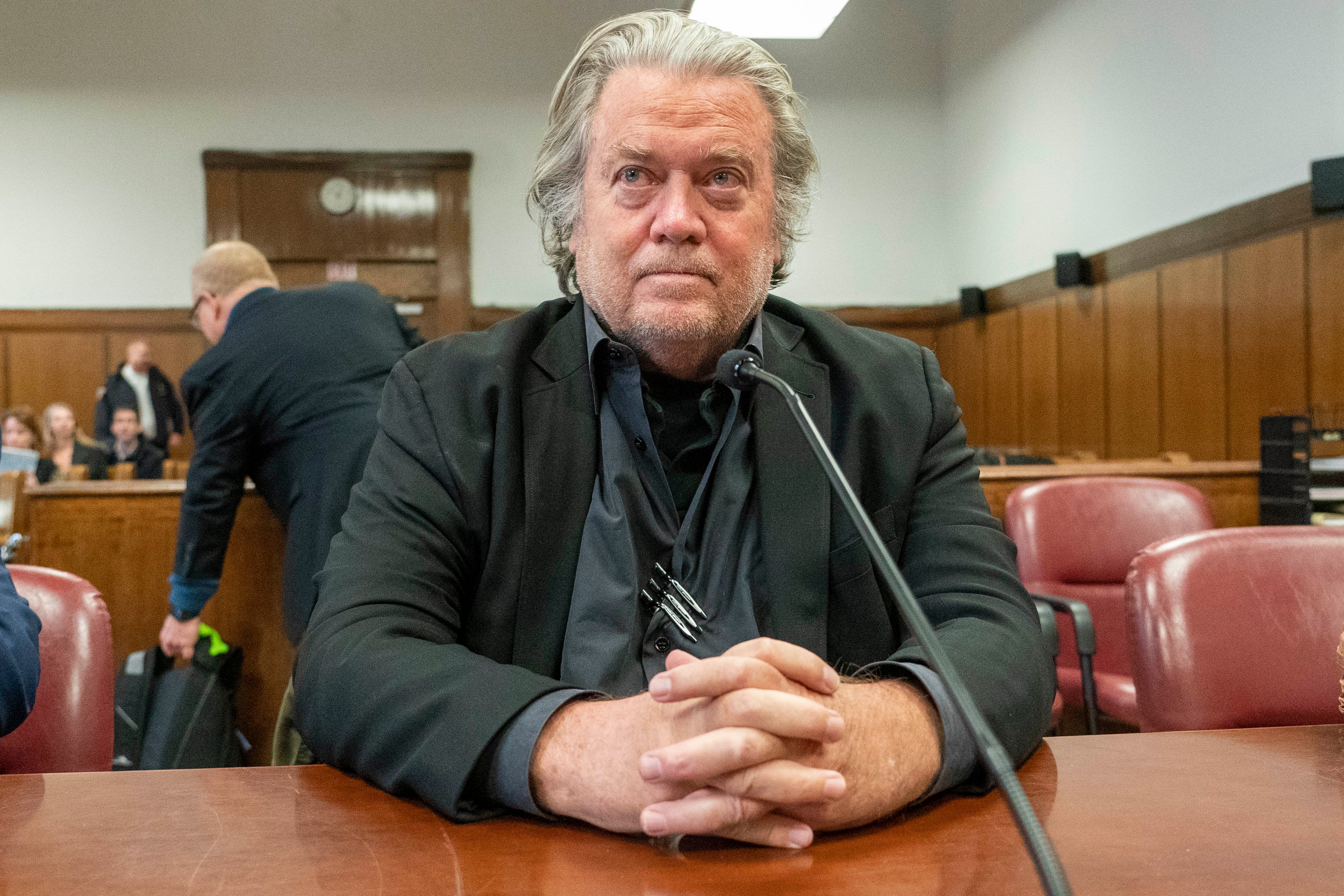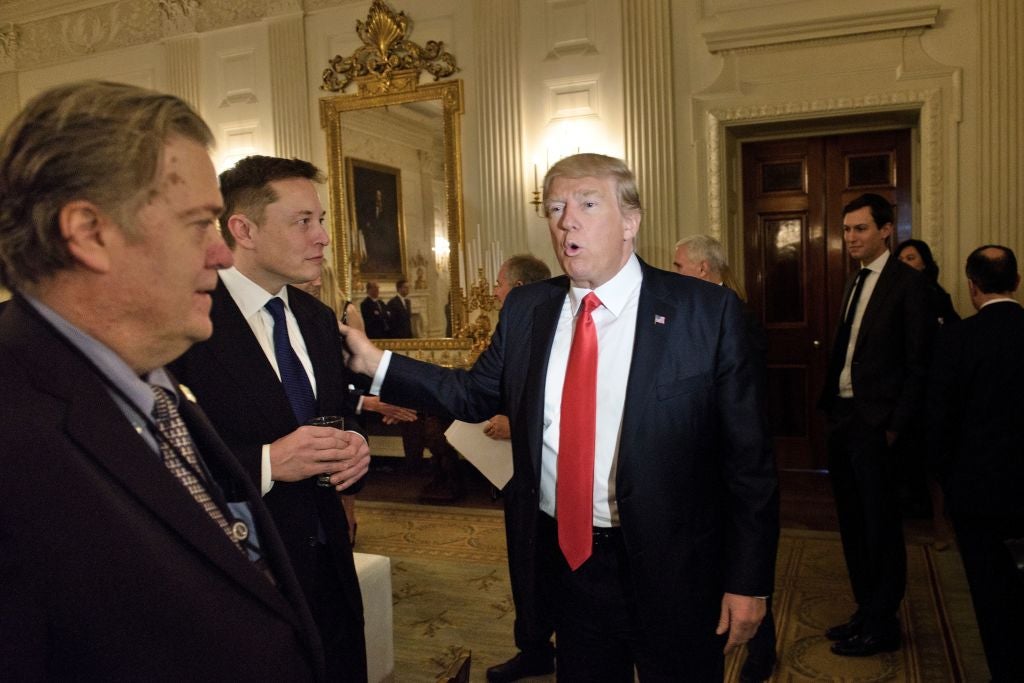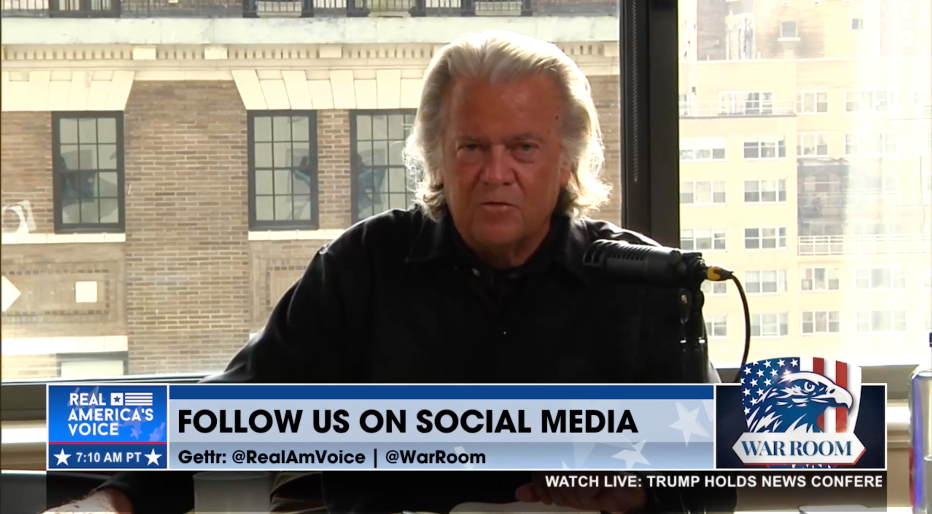Within hours of being released from federal prison, Steve Bannon returned to his rightwing show “War Room” to declare Kamala Harris a “fascist,” repeat election fraud claims, and label himself a “political prisoner” — perhaps an omen of the potential damage he could cause in the few days remaining before the 2024 election.
On Tuesday, Bannon became a free man — and immediately renewed his support for Donald Trump — after a four-month stint at FCI Danbury following a contempt of Congress conviction for not complying with a House panel investigating the January 6 insurrection.
The 70-year-old with a shaggy gray mop and ever-present scruff may appear unassuming, but the damage he can do in the final stretch of the election could be consequential, given his track record and his constant proximity to a microphone.
“Steve Bannon is the intellectual leader and general of the MAGA movement,” Mike Davis, a frequent contributor on “War Room,” told the New York Times.
Ex-Trump trade adviser Peter Navarro predicted to the outlet that Bannon would drive voters to the polls: “He’ll do that broadcasting the show, and he will reach a lot of people with the message of how important this election is.”
The federal prison stint “not only didn’t break me, but it empowered me,” Bannon told his “War Room” listeners on Tuesday upon his return to the airwaves.
If there’s one thing Bannon has long had, it’s power. He may no longer be within a few feet of Trump, but his influence on the former president’s supporters could still be significant.
Bannon has lived many lives. He was an officer in the Navy, went to Harvard Business School and was a Goldman Sachs investment banker. Then in the 1990s, he started working in the film industry as an executive producer.
In 2012, Bannon took on the position that launched him into the spotlight: executive chairman of the conservative news site Breitbart. While there, he wiggled his way into Trump’s favor as Breitbart published fawning stories about the then-presidential candidate. His work there prompted Bloomberg to dub him in 2015 as “the most dangerous political operative in America.”
By August 2016, he successfully attracted the attention of Trump, who tapped Bannon to serve as the chief executive of his campaign, a role that later segued into him becoming Trump’s chief strategist in the White House.

“Many former employees of Breitbart News are afraid of Steve Bannon,” Ben Shapiro, then an editor-at-large at the outlet, wrote when Bannon was hired by the Trump campaign. “He is a vindictive, nasty figure, infamous for verbally abusing supposed friends and threatening enemies.”
When Bannon was tapped to serve in Trump’s White House, 170 Democrats signed a letter oppoising the appointment, citing his divisiveness.
“Millions of Americans have expressed fear and concern about how they will be treated by the Trump Administration and your appointment of Mr Bannon only exacerbates and validates their concerns,” the Congress members wrote in 2016. “As the Executive Chairman of BreitbartNews, Mr Bannon repeatedly and aggressively pushed stories that promote anti-Semitism, xenophobia, and racism.”
But his stint in the White House was cut short in 2017. Bannon reportedly said disparaging remarks about Trump’s children, including calling daughter Ivanka “dumb as a brick”, leading the livid then-president to fire his chief strategist, saying he had “lost his mind.”

While watching Trump’s State of the Union address in 2018, Bannon provided a Bloomberg reporter with a crucial insight into his strategy: “The real opposition is the media. And the way to deal with them is to flood the zone with s**t.”
In other words, throwing so much disinformation into the ether that it becomes impossible to separate fact from fiction. As journalists try to sift for the truth, Trump and his allies became a disinformation machine, churning out an incredibly daunting list of claims to fact-check— while simultaneously blaming the mainstream media as broadcasting “fake news.”
Perhaps that effort is best exhibited by “War Room,” which Bannon started in 2019 to counteract the “master class” in “political warfare” seen in the first impeachment of Donald Trump, he told Yahoo News at the time.
Ever since, Bannon, via the show, has served as Trump’s mouthpiece. He has laid bare his feelings about controversy du jour: Covid-19 mandates, the Biden family, and election fraud claims.
In fact, “War Room” was found to be the biggest offender of spreading election misinformation, leading the other top 20 political podcasts tracked from the date that Biden accepted the Democratic nomination through January 6, 2021, according to a 2022 Brookings Institution analysis.
Trump and his allies are still promoting “rigged” 2020 election allegations — despite courts across the country finding no evidence to support them — and are already questioning the 2024 election before it’s happened.
Perhaps it’s no surprise, then, that Bannon is already “flooding the zone” with more baseless claims in the final stretch before Election Day.

On his return to War Room on Tuesday, he promoted 2020 “stolen” election conspiracies. He suggested Democrats will do anything to try to “nullify and delegitimize” the election if Trump wins — which he dubbed a “third victory.”
But perhaps most terrifyingly, he warned: “If you’re not prepared to be sent to a federal prison as a political prisoner, then you’re not worthy to be in this movement, and to step forward and try to save your country.
“You have to understand: they want to put you in prison and they will put you in prison. If you can’t accept that, then you don’t know what they represent.”
He is speaking as a self-described “political prisoner.” Even behind bars, Bannon has been putting in the work for the former president, not taking a break from spewing Trumpian rhetoric.
He taught a weekly civics class for fellow inmates at Danbury every Tuesday afternoon this fall, Rolling Stone reported, where he echoed some of Trump’s defenses. He told the group that Taylor Swift was a cult leader, repeated Trump’s concerns about the 60 Minutes interview, and suggested he wouldn’t deter Trump from deploying the US military against US citizens — a move that the GOP nominee has reportedly threatened numerous times.
Bannon told the class that the constitution prohibits this action, prompting a student to quip: “You might need to remind Trump that he can’t do it.”
“Why would I want to do that?” Bannon asked.
The MAGA fixture has a few more days to exact his influence once again before November 5.
“To the ruling class in this country, they’re right, I am dangerous,” Bannon warned inThe Wall Street Journal in July before turning himself in. “And guess what? I’m gonna be a lot more dangerous. So they’re right.”







